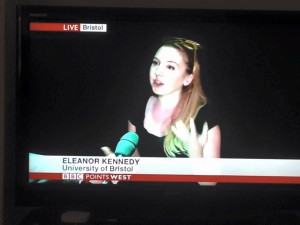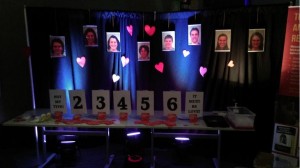By Eleanor Kennedey @Nelllor_
Since beginning my PhD with TARG a few months ago I have been repeatedly presented with pleasant surprises. My new colleagues have been more than welcoming; the research in the group is diverse and interesting and, of course, the city of Bristol itself is a joy to live in. Given that the University is at the heart of the city, it’s not hard to get involved with public events as a member of the University of Bristol. One excellent location for this type of involvement is the @tBristol Science Centre – an interactive exhibition centre that hosts events for all the family. Last week there was a special event for adults called Luck & Love, aptly named because it took place on the eve of Valentine’s Day and on ‘unlucky’ Friday the 13th. Our group was demonstrating the effect that alcohol has on perceiving attractiveness, or the ‘Beer Goggles Effect’ as it is more commonlyknown. Being an enthusiastic science-type I jumped at the chance to help with the TARG stall at the eventand even ended up on TV!

The day before the event, someone in the team asked if I would speak to the BBC on the night; I immediately responded with a gleeful “Yes!” and afterwards asked what I had just agreed to do. Talking on live television about research that is not even my own is what I had agreed to… Suddenly my impulsive answer seemed a bit unwise; still, as the saying goes, “no risk no fun”, so I kept my promise. On the evening, after helping with stall preparations (complete with colourful lights and paper love-heart décor) I met the man from BBC Points West to go over what I might say. It was just one answer to one question: “What is the science behind the “Beer Goggles” effect?” Luckily I managed to answer on live TV without passing out or giving in to the temptation to shout “Hi Mum!” With novelty beer-goggle sunglasses atop my head I explained to the BBC that facial symmetry has been identified as a key underlying feature of what people consider to be attractive. The beer goggles effect may come about, at least partly, because alcohol inhibits the ability to detect facial symmetry so more asymmetric faces will appear more attractive than without alcohol.

On the evening, we set up a stall with pictures of 4 male and 4 female faces and a rating scale ranging from ‘Not my Type’ to ‘It Must be Love’. Attendees of the event were asked to rate each face by dropping counters into the rating-scale tubes. Participants who had up to 1 alcoholic drink were given white counters, while red counters were given to those who had 2 or more drinks. A study carried out in our lab found higher ratings of facial stimuli of same-sex and opposite-sex faces in a group of social drinkers who had consumed an alcoholic drink compared to those who had consumed a placebo drink. The study was also carried out in a few pubs around Bristol, with patrons rating same-sex and opposite-sex faces as well as landscapes. Interestingly, compared to participants who had not had an alcoholic drink, those who had consumed alcohol rated opposite-sex faces as more attractive, while there was no difference between groups for same-sex and landscape stimuli. That night we expected more red counters (for 2 or more drinks) at the higher end of the scale.
This was my first event like this, and one thing I quickly learned was that taking my time chatting to people was best. In previous research assistant roles there has generally been a limited amount of time to carry out the experiment so once the information sheet was understood, the focus was on completing the tasks at hand rather than chatting with participants about the research. For me, the joy of the event was being able to take my time in chatting to people about our research and the theories behind the beer goggles effect, rather than concentrating primarily on collecting data. It was great to see how amused people were by the concept and they seemed to have fun rating some strangers’ faces.
Overall the night was really enjoyable; chatting to people about the research carried out by our group and hearing their opinions on it was great. The @Bristol team put on an excellent event, I got the opportunity to try out a few other things going on, such as dissecting a pig’s heart and testing my tolerance threshold for hot flavours (tip: don’t start at the hottest level of spice…). I will definitely put myself forward for more public engagement events like this and will add it to the list of pleasant PhD surprises.
